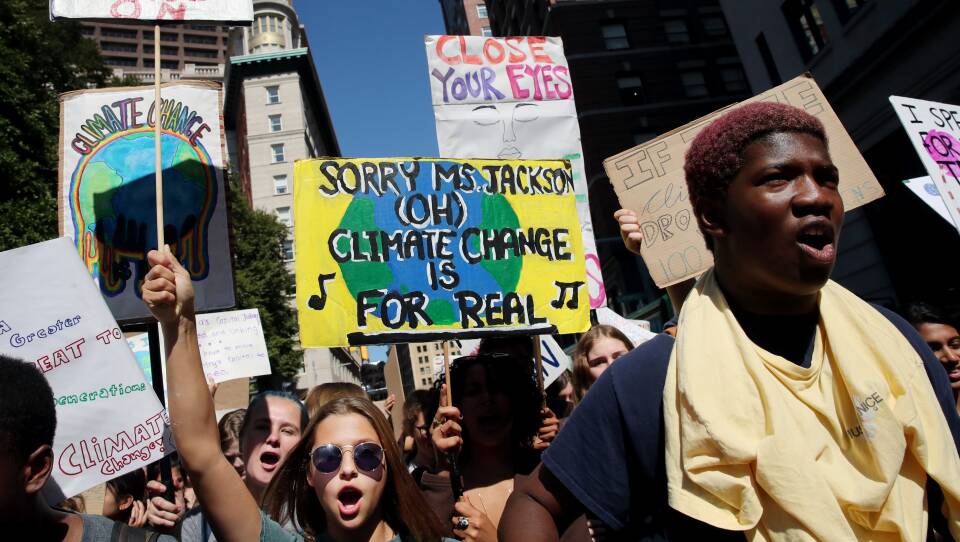The town of Wellesley has announced a climate action plan that relies heavily on seeking individual actions by residents to help the town meet an ambitious goal of net-zero emissions by 2050.
The plan, released last Thursday, would make the biggest emissions cuts in buildings and transportation. To achieve its goal of net-zero emissions in the next three decades, the town and its partners plan to change policies, build up public infrastructure, and get residents on board with taking action in their own homes. They also plan to lead by example by greening municipal operations.
“The targets are ridiculously ambitious,” said Martha Collins, a member of the town’s Climate Action Committee who spearheaded the mobility portion of the plan. “They're very, very ambitious. But they're not just ambitious for us, they're ambitious for the state, they're ambitious for our nation.”
Its targets align with Massachusetts’ plan to reach net-zero emissions by 2050, which Gov. Charlie Baker signed into law last March.
More Local News
Buildings and transportation make up 94% of Wellesley’s emissions, according to town data. By far the largest contributor is residential buildings, which account for 39% of all town emissions, so a key part of Wellesley’s action plan centers on educating residents on steps they can take.
Laura Olton, the chair of Wellesley’s Climate Action Committee, said residents need to take "substantial steps" to reduce their own emissions. Actions outlined in the town's plan include electrifying homes and switching over to electric vehicles.
“It's going to be a huge PR thing to explain to people: As their air conditioner dies, they need to replace it with the air source heat pump. Or if their oil burner starts to go … size your house up for an air source heat pump,” said Mary Gard, a leader in the community nonprofit Sustainable Wellesley, who worked on the plan. “That's sort of the hard part, because we aren't there when the oil furnace goes.”
And the town of fewer than 30,000 residents is limited in its ability to enact these changes. There are only so many local contractors who know how to install the heat pumps, Gard said, and towns aren’t able to set stricter building codes than the state’s. The Department of Energy Resources is drafting a set of stricter building codes, which towns could opt into, that would contribute to major emissions reductions. The department is still taking public comments on the new codes and planning public hearings, leaving them still many months away from implementation.
“If Wellesley could opt into something like that — if it gets to a positive end point, and is something that could really help us with our goals,” said Marybeth Martello, Wellesley’s sustainability director.
Wellesley, like many other towns, saw a dramatic cuts in transportation emissions during the pandemic. It met its goal in 2020 for cutting emissions by 25% compared to 2007 levels, but town employees attributed that accomplishment to COVID-19: work-from-home policies kept many residents off the road and out of their emissions-producing cars.
The climate action plan focuses on pushing individuals to switch to electric vehicles, aiming to get 11% of cars in town to be electric by 2025, 30% by 2030 and 100% by 2050. The town will release another plan that more broadly looks at transit in the coming months to expand and promote public transit alternatives, biking and walking.
“The education part and the changing behavior is the huge part of it,” Collins said. “It's not our problem — the Climate Action Committee — it's the whole town's problem, it's the whole state’s problem, it's the whole nation and world’s problem. And so everybody has to sort of pitch in and help to make it successful.”
Martello said that pulling together the town’s different stakeholders was critical: active community organizations and departments from across Wellesley’s government worked with the sustainability staff. It’s a project that’s been in the works since late 2020.
“Wellesley has been working on climate and greenhouse gas emissions reduction since 2009. We set our first goal as a town back then, which is really ahead of a lot of towns in Massachusetts,” Martello said. “There's many, many great things that have been happening. But I think that the climate action plan really takes us into a new era.”








